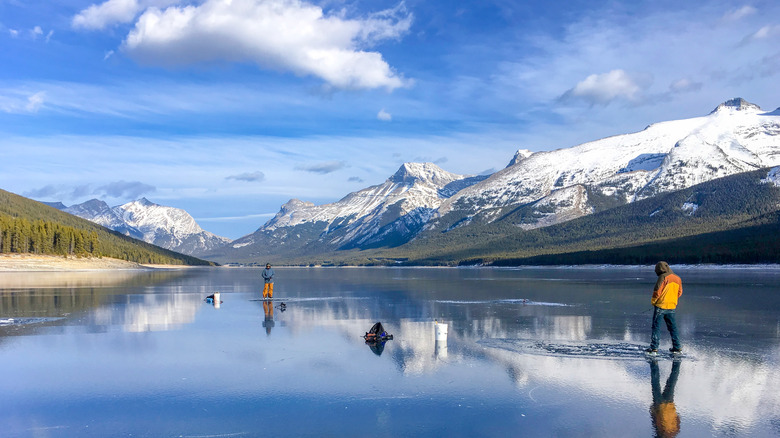Canada
Canada is nicknamed “The Great White North” for a reason, as most provinces and cities receive a decent amount of snowfall each year. Depending on where you choose to visit, the snowflakes can begin to accumulate as early as October and November (in places like Alberta and Yukon) and last through March or even April, as is often the case in Québec, where it can take a while to melt fully. This is truly the place to be if you love snow and winter sports, so if you’re looking to escape the cold, keep scrolling. However, if you love this season, Canada is the place for your January escape.
In British Columbia, you can enjoy some of the country’s best beaches sans crowds on Vancouver Island. Or, head to the mainland and ski in the famous Whistler, where Olympians train. Continue east to Alberta, where well-known national parks such as Jasper and Banff are in peak winter wonderland mode. You can ski, snowboard, or take a winter hike through the iconic Rocky Mountains. In Manitoba or Saskatchewan, go snowshoeing through the endless Canadian prairies or try your hand at ice fishing. In Québec, check out the maple syrup capital of the world and visit a cabane à sucre, or sugar cabin. In the Atlantic provinces, enjoy winter activities with sea views. And, of course, no matter what province you find yourself in, hockey season will be in full swing, and ice rinks can be found at most public parks and city centers.
Greece
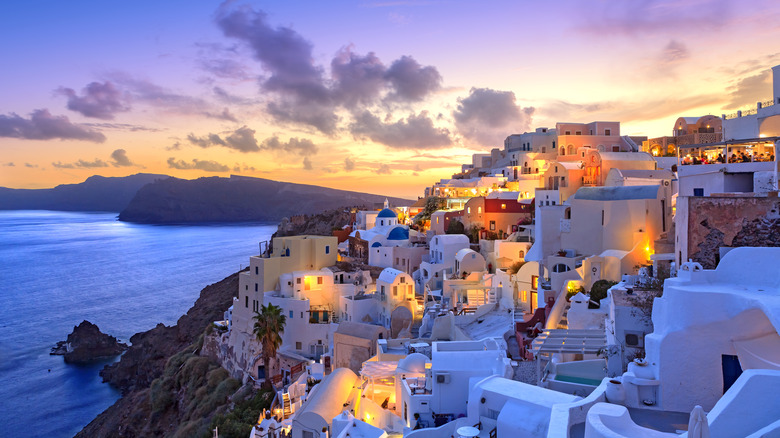
January might not be the most obvious time to visit Greece. The Mediterranean is warmer than the rest of Europe during this month, but the temperatures won’t be hot enough to swim or sunbathe. However, it is a tremendous time of year to visit if you want to avoid crowds and what can be a high-cost Greek vacation. According to Statista, visitors to the country more than doubled between 2005 and 2019. Of course, the past few years saw a drastic decline, but 2022 showed levels near those pre-pandemic.
Most assume it’s necessary to save for years and expect many others to be on holiday along with you, and these assumptions can be true if you visit during the peak months of June through August. Alternatively, data from CEIC shows tourist numbers in Greece begin to taper off in September and are at their lowest in winter, including January. Thus, this is the time to go if you want to enjoy popular destinations such as Santorini or the Acropolis without being elbow-to-elbow with other visitors. As for cost, that’s another benefit of visiting in the off-season, as airfare and hotels will be cheap after the winter holidays. A roundtrip flight from JFK to Athens costs $865 in August versus $488 for the same route in January. Similarly, accommodation costs drop in January, with hotels and apartments costing nearly double in the summer versus wintertime.
Ecuador
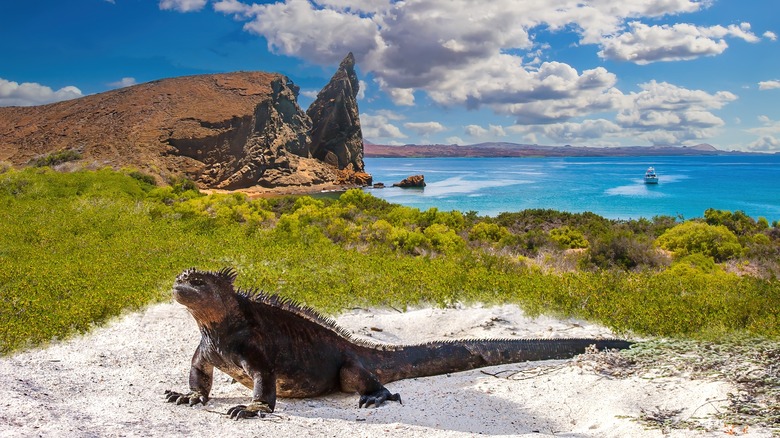
FOTOGRIN/Shutterstock
Thanks to its location right on the equator, Ecuador is a great destination year-round. The weather is always pleasant, and the seasons don’t fluctuate too drastically. If you want to flee the frigid temps further north, it’s a terrific place to go. January is one of the warmer months, so if you want to swim or just enjoy the heat, it’s a great time to plan a trip, especially if you want to visit the coast. However, it is the beginning of the wet season, so if you melt in the rain, perhaps hold off. This also means flooding and closed roads are likely in the rainforest, so keep that in mind if it’s an important part of your trip.
Ecuador is still a bit of a hidden gem outside of the Galápagos Islands, although the seas are relatively calm at this time of year, making it the ideal time to explore those famous islands and their history-making biodiversity. Mainland Ecuador is quiet in January, so you won’t have hordes of other tourists to contend with on tours and at stunning sites like the UNESCO-protected historic center of Quito. Just make sure to avoid dates close to New Year’s, as that can be a busy time in the country.
Ireland
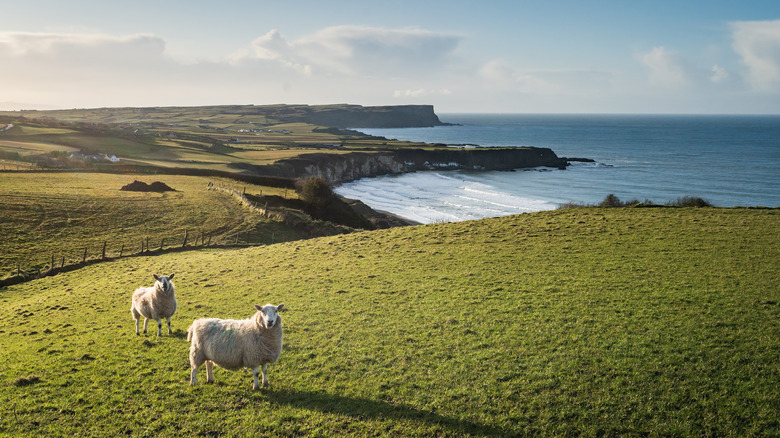
Alan Currie/Getty Images
Most travelers to the Emerald Isle understandably visit in the summer in search of nicer weather in a country famous for rain. However, before you jet off in the peak seasons, consider that there isn’t really a proper summer here. Temperatures in the country only average in the high 50s to low 60s degrees Fahrenheit – not exactly bikini weather. Additionally, while June is considered the driest month, rainfall is common most of the year. So before you turn your nose up at a winter trip to Ireland, remember the climate and the fact that this month comes with perks — like smaller crowds.
In between the December holidays and February school breaks, January sees the least amount of tourists, so if you’re hoping to catch the Cliffs of Moher or drive the Ring of Kerry in the most pleasant of circumstances, this is the month to go! Additionally, it is a more affordable time to visit as flights from the U.S. are cheapest in November, January, and February. As is accommodation, although if you prioritize B&Bs and avoid hotels, that can also help. And the temps typically stay around 45 degrees Fahrenheit, just with more rain, but honestly, that’s more of an authentic Irish trip than sunny skies the whole time!
Egypt
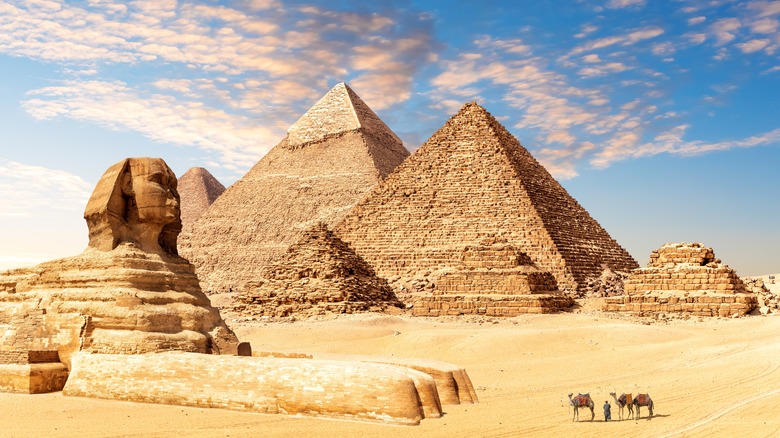
AlexAnton/Shutterstock
Egypt is a bucket-list destination for many, and understandably so. While January is certainly during peak season, there are a few good arguments for why it’s a fantastic time to visit. Firstly, the hot desert climate means much of the year is not recommended unless you love the heat, but even then, the average highs from June through August are well over 100 degrees Fahrenheit. That, combined with the relentless summer sun, means that even if you are okay with scorching temps, sightseeing and actually enjoying Egypt is more difficult during these months.
The best time to go, for the most pleasant weather, is winter. However, it is a popular holiday destination, so to avoid the biggest crowds, plan to go after Christmas and New Year. Another perk of peak season is that most sites and tours will be open and operating. This is great reassurance as Egypt is a country where every corner is full of “must-sees,” and it would be disappointing to go all that way and not be able to visit somewhere you’d dreamt of for years.
Nepal
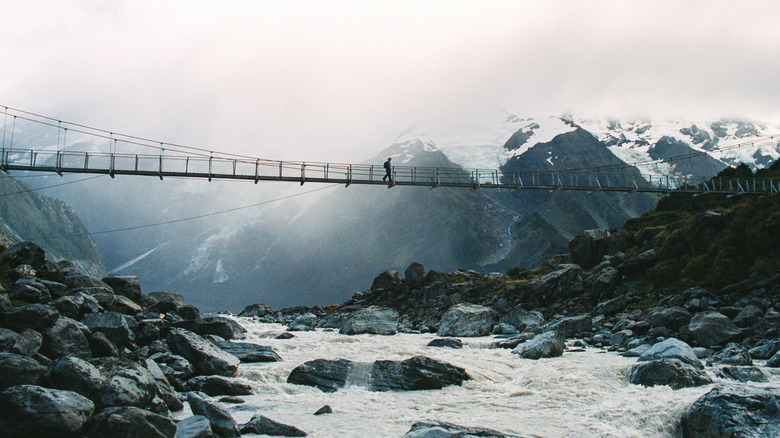
Wilpunt/Getty Images
Winter isn’t the standard season to visit Nepal, but it brings clear blue skies, many sunny days, and fewer crowds, a fabulous recipe for avid hikers to have the most pleasant experience. However, if you’re a novice or not very experienced in the mountains, winter isn’t the best time to visit. For those confident hitting the trails amid heavy snow, keep treks shorter and at lower elevations. You’ll still reap the benefits of cool and clear skies as the visibility will be much better than at other times of the year.
Additionally, while there is quite a lot of snow up in the peaks, it isn’t actually that cold when you aren’t at higher elevations. Even in January, parts of the country can see highs around 65 degrees Fahrenheit. And, for those interested, there are two major festivals around the country during the month. The Tharu community celebrates Maghe Sankranti, marking the end of the winter solstice with numerous sweet treats as well as parades and decorations all over towns. Lhosar is a fete for the Tibetan community in Nepal, beginning in January and running through February, to purify and renew for the upcoming year.
France
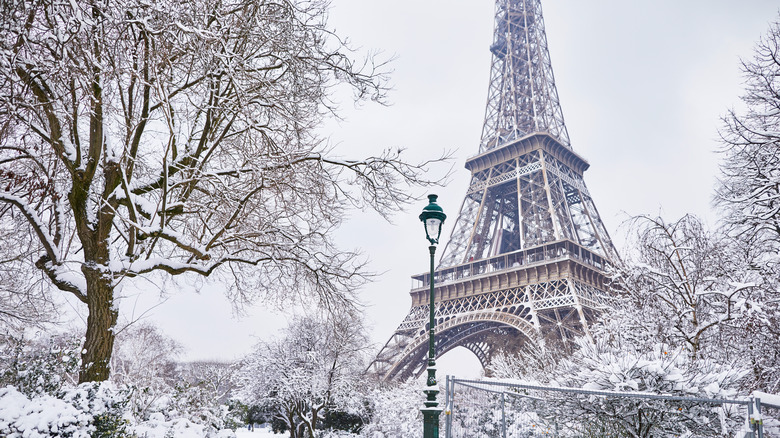
Encrier/Getty Images
January in France is right in the sweet spot between the December holidays and mid-to-late February. The former is the Christmas market season, the peak winter time around France and neighboring countries for tourist arrivals, while February is when French children have their winter break, and many destinations around the country can be very busy as a result. So, if you want the most affordable and least crowded experience on your trip to France, January is ideal. If shorter lines at the Eiffel Tower, more room on trains, and less competition for restaurant reservations sound like your cup of tea, book flights post-New Year’s. And if you want to ski or snowboard at one of the famous resorts in the Alps, January provides less competition on chairlifts and the slopes.
It can also be an excellent time to save some cash on a trip to this famously not-budget-friendly country. Flights from the United States to France are around $200 cheaper in January when compared to June, and accommodation is also much less expensive.
Mexico
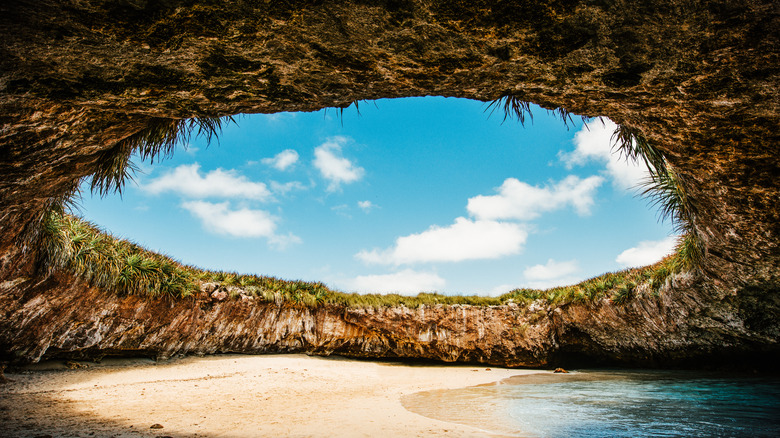
Ferrantraite/Getty Images
Maybe you don’t ski, or you’ve had enough of frigid temps and putting on a minimum of three layers before leaving the house. January is a rough month to feel motivated to get out of bed, let alone voluntarily go outside into peak (ahem, well, really low) winter temps. A trip to Mexico could be just what you are after! January is the perfect time to head south of the border as the rainstorms of monsoon season have long gone, and clear skies and beaches await you. Sure, it’s one of the “cooler” times to visit the country, but with temperatures ranging from 60 to 80 degrees Fahrenheit (depending on where you visit), it will still beat defrosting your car every morning.
Additionally, it’s also less busy than December and February, with fewer people to contend with for a spot on the beach or space on tours. And since you aren’t fighting rain all the time, hiking, surfing, and any other activity will be much more enjoyable. Additionally, January is a great time to visit popular places in the country, such as Cancun, Tulum, Los Cabos, and Mexico City, due to lower visitor numbers.
Japan
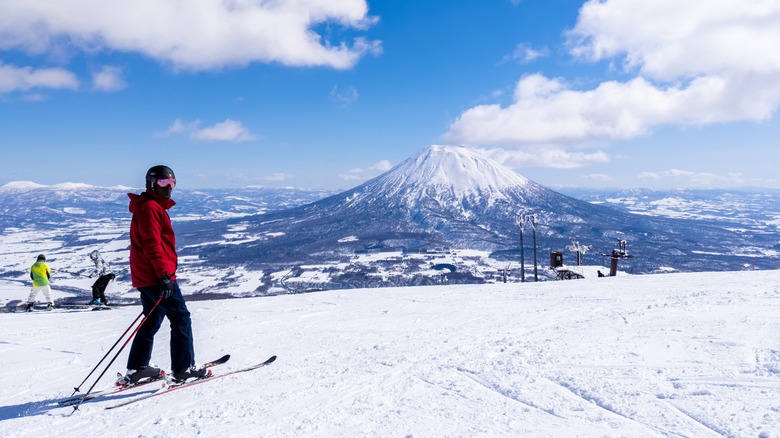
Mayumi.K.Photography/Shutterstock
Japan isn’t typically thought of as a winter trip, as travelers love it in fall for its stunning foliage and in spring for the country’s world-famous cherry blossoms. However, if you love everything about the colder time of year, Japan absolutely needs to feature on your list of places to visit in January. Niseko and Furano on the island of Hokkaido are popular resorts known for fantastic night skiing. And for your après, enjoy a choice of hot springs, onsens, and snow monkey viewings. Hokkaido is also where ramen is said to have originated, so indulge as much as you can! The largest city on the island, Sapporo (yes, it’s where the beer comes from) makes a great January base for non-winter sports enthusiasts. Many hot springs and snow monkey spots are doable as day trips, and there are wonderful winter hikes to go on; just make sure you have the correct gear.
Other popular ski destinations in Japan include Hakuba, which hosted Olympic events in 1998, and Yuzawa, which is only a short train ride from Tokyo. Both are fantastic options if you want to avoid the trek up to Hokkaido via an all-day train or a shorter flight. Finally, winter temps mean the country will be less crowded overall, and it is also one of the cheapest months to fly to Japan.
South Africa
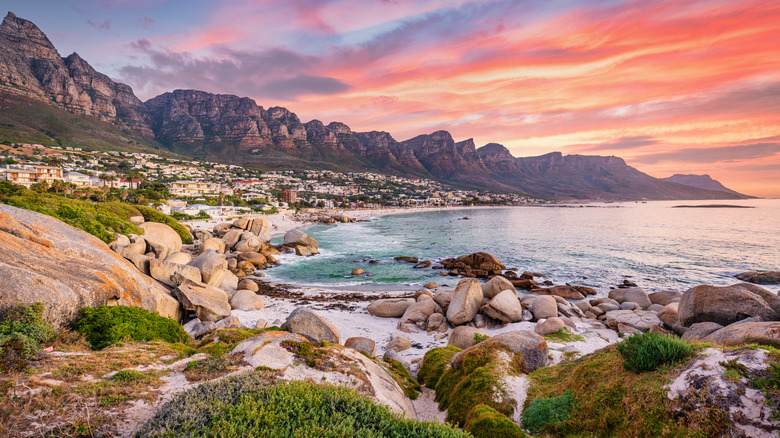
Mlenny/Getty Images
January is peak summer in South Africa, which means high temps and crowds, but the country truly comes to life during the season and makes all of that more than worth it. The trifecta of a South African summer are beach days, road trips, and wine tasting, and this is the prime time to do all three. The country’s now Insta-famous beaches may be busy during this time, but that translates to most amenities being available for travelers. It’s also a great time to go on a famous road trip like the Eastern Cape or the Garden Route. Summer weather means no rain, flooding, or storms to contend with along the coast. Don’t miss a detour into the internationally renowned wine country, as long sunny days call for tasting with vineyard views.
Keep in mind that South Africa’s fascinating safaris can be a bit challenging during this period as the animals aren’t congregating around water sources. While the verdant vegetation makes for a breathtaking backdrop, it is quite thick and can make visibility poor for spotting game. However, it’s the time of the year with the most baby animals out and about, which is always a fun thing to spot. Finally, January is also a big month for festivals in South Africa. Check out Kaapse Klopse and the Johannesburg International Mozart Festival, as well as numerous outdoor concerts.
Thailand
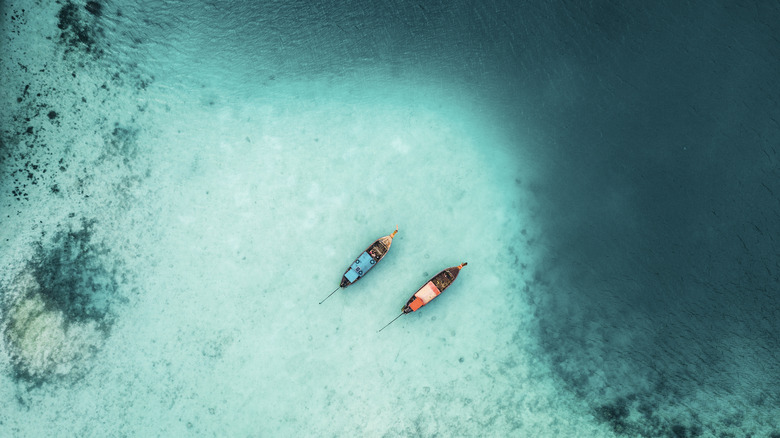
Oleh_slobodeniuk/Getty Images
January is a fantastic time to visit the “Land of Smiles,” with the hot season long gone and temperatures hovering between 75 and 85 degrees Fahrenheit. That depends on where you visit in the country. The north and higher altitude areas, like the mountains, are a bit cooler, with temps touching 70 degrees Fahrenheit, which is arguably perfect trekking weather. Additionally, the heavy rains of the monsoon season have come and gone, ensuring you won’t need to duck for cover, whether on the beach in Koh Tao or sipping cocktails in Bangkok.
There’s also the benefit of two New Year celebrations in one month. Thailand joins most of the world in celebrating on January 1 while also getting in the party mood for Chinese New Year. The latter often falls in February, but celebrations take place in January as well. The one potential downside of visiting in January is that due to the perfect weather (especially compared to a lot of the rest of the world), it can be quite busy. So while you’ll enjoy sunny skies and pad thai, you won’t exactly be doing so without company.

